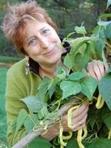practice makes practice: part one
"Practice makes perfect." We've all heard it. Many of us have said it. But what a damned lie it is! And what assumptions that damned lie makes!
That there is "perfect", first off, and that once you've reached it, you've reached
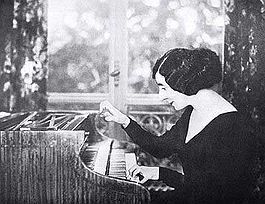 it. That there is a clear linear progression. It goes from where one is (imperfect) through "practice" (an activity undertaken solely to achieve a clear, previously decided-upon goal, perfection) to where one should be (perfect). (Pictured above : the harpsichordist Wanda Landowska, who had
it. That there is a clear linear progression. It goes from where one is (imperfect) through "practice" (an activity undertaken solely to achieve a clear, previously decided-upon goal, perfection) to where one should be (perfect). (Pictured above : the harpsichordist Wanda Landowska, who had something remarkable to say about practice, and who we'll meet later in
this post).
"Practice makes perfect" also contains many implicit questions. But it answers not one of them. Questions such as: If I get to 'perfect', what then? Where's the next? Am I just supposed to stay perfect once I've achieved it? Is this perfection static, final? And, once I have made it to perfect, do I have to keep practicing to stay there, or not?
I much prefer the truth: practice makes practice.

This elegant, accurate, precise maxim is not original to me. And whenever I use a
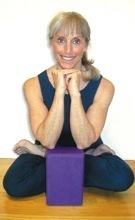 direct quote of someone else's piece of wisdom, I like to give attribution. But here's the problem with this one: I heard it from a woman named Susan, whose last name I don't know, and whose phone number I don't have. She said it to me after a Powerseed Yoga class with Sandy Curry almost four years ago ( Sandy pictured left; I took with her weekly, sometimes a couple of times a week, for four years, in Walpole, New Hampshire, until she moved to Philadelphia about a year ago. I am not the only student of hers who still grieves her departure.)
direct quote of someone else's piece of wisdom, I like to give attribution. But here's the problem with this one: I heard it from a woman named Susan, whose last name I don't know, and whose phone number I don't have. She said it to me after a Powerseed Yoga class with Sandy Curry almost four years ago ( Sandy pictured left; I took with her weekly, sometimes a couple of times a week, for four years, in Walpole, New Hampshire, until she moved to Philadelphia about a year ago. I am not the only student of hers who still grieves her departure.) After this particular class, Susan and I were discussing some poses neither of us had been able to come close to executing that day, among them, for me, Crow; I couldn't even get one foot off the ground.
And Susan said, "It was an off day for me, too, I couldn't even do Tree without standing next to a wall for balance. But, as my old yoga teacher used to say, 'practice makes practice.' "
Like a stone thrown in a pond, I watched the ripples of this statement, delivered so offhandedly, spread out and out into my understanding. I'm still watching. I'm still understanding.

This statement comes up often in my internal, eternal dialogue with myself (you know, the conversation within, in which all of us engage in constantly). Time after time, in activity after activity.
For instance: When I just don't want to work out or go on a walk but do anyway, sometimes turning out to enjoy it midway through, sometimes resenting every step or bicep curl, but almost always feeling glad I have done it afterward: I find myself thinking "practice makes practice."
For instance: When I procrastinate about writing, finally start writing, find writing that day like bicycling through hot tar, am sure that what I've written is flat, [image error]contrived, lifeless... When I find, sitting down to write the next day, that what I had written the day before was actually pretty good and that it takes a little less angst to get into it... When I find, the day after that, that I leap into writing as eagerly as I dive into the chilly pond on my property on a hot day, a thoughtless,
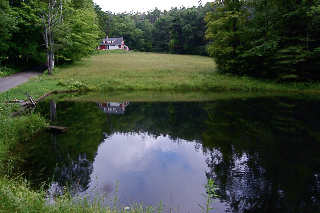
hungry, OH-I've-been-waiting-for-this plunge, quickly losing all sense of self, time, or evaluation in the act itself...Only to repeat the whole cycle on the next writing project...
Again, considering this, I find myself thinking "Well, you know, CD, you're never done, you're never there, it's practice makes
practice." (Our pond, pictured above, photographed by David R. Koff: been spending a lot of time in it, this exceptionally hot July of 2010).
For instance: When I feel anxious --- about the perennial sense of not-enough-time, the sometimes-sense of not-enough-money, and the brand-new and at times exceptionally ugly dispute that is looming between my brother and myself about my 95-year-old mother's care --- I think, first, "Why is it, that since I know anxiety is part of the process, and is an unhelpful emotion, that I'm still so affected by it? Why haven't I learned to accept it and just not get too wrapped up in it?"
And then I think, second, "Knowing how it works doesn't exempt you from it." (After all, just because you're an electrician doesn't mean you dont have a fuse occasionally blow. Just because you're a plumber doesn't exempt your pipes from freezing if the winter's cold enough).
And then, third, I think, "Oh. Right. Practice! I just get to practice what it's like to hang out with anxiety some more, not worry about getting over it. Feel it, but don't let it run the show. Use it. Practice. Practice makes practice."

I often think of this, too, when in conversation with others.
When my friend M., pregnant with her first child, said to me, "I just don't know if I'm ready to have a child," I said. "Honey, I don't think anyone's ever ready for anything big. Not beforehand. Doing it makes you ready. Being a parent is the only thing that really teaches you how to be a parent."
This is advice I have more or less given for years when anyone tells me they don't feel ready to get married, study in a foreign country, read their writing aloud to others, or quit their job as a dental hygienist and become a landscape artist.
Because I deeply believe that doing something is what teaches you how to do it.
I'm not saying you shouldn't take classes, read books, develop business plans, talk 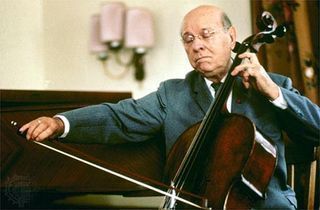 to others who've done whatever it is you want to do but feel unready for --- I'm just saying, if that's all you do, if you wait till you feel fully ready to do it, you probably never will. (Left, cellist Pablo Casals, another great practice devotee, who we'll meet below)
to others who've done whatever it is you want to do but feel unready for --- I'm just saying, if that's all you do, if you wait till you feel fully ready to do it, you probably never will. (Left, cellist Pablo Casals, another great practice devotee, who we'll meet below)
And if you do feel fully ready, well, I think in most cases you are probably the proverbial apple cart. Get ready (not that it's possible to get ready) to be knocked over.
And being knocked over teaches you how to be knocked over - and how to get up again, paradigm altered. Practice makes practice.
I knew, pretty quickly, that "practice makes practice," which was
teaching me so much, would be incorporated into my work as a
teacher (for instance, in the Fearless Writing workshops I teach; and of course it became a cornerstone of Build Your Writing Practice).
So naturally I
had to find out to whom to attribute it.
The next time I ran into Susan was on a cold day several months later, outside the Saxtons River Village Market.
I was coming out, with two containers of Liberte Yogurt in an environmentally-correct canvas sack. She, holding her two canvas sacks, was about to go in. The first snowflakes of the season flew. We greeted each other. I said to her, quickly, because it was cold, "Hey, Susan, I've been wondering about something, and I was hoping you could clear it up for me."
She said, "Yes?", drawing her black coat around her a little more closely.
"You remember that thing you told me about practice, after Sandy's yoga class back in, oh, it must have been August, September?"
She looked at me blankly. "Hunh?" she said.
"You know, that thing you told me your previous yoga teacher told you. About how 'practice makes practice' ? "
She said, "I'm sorry, Crescent, I don't remember this at all."
"Well, what was the name of your old yoga teacher?"
She said, shaking her head, "I'm really sorry, but I have no idea what you're talking about. And I've taken yoga with a lot of different people. "
I said, "Well, thank you anyway." We said our goodbyes. She went into the market and I went back down the bricked ramp to my car. Perplexed: I knew she had said that to me.
I'd first met Susan at the home of my neighbor Peter; they were intermittent friends. I asked him for light-shedding. "Oh," he said, with a dismissive flutter of the hand, "her memory has a tendency to come and go."
So, dear person, whoever you are, who told Susan "practice makes practice," and dear Susan, who, though you've forgotten it, passed this on to me, thank you.
Or maybe I should shortcut all this and just say, "Thanks, Universe. I needed that. Much appreciated."
Here is what the great Polish-born pianist Arthur Rubenstein
(pictured left) said
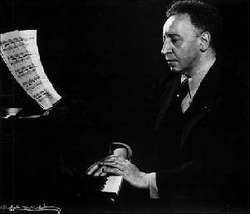 about practice.""\When I don't practice for a day, I know. When I don't practice for two days, the orchestra knows. When I don't practice for three days, the world knows."
about practice.""\When I don't practice for a day, I know. When I don't practice for two days, the orchestra knows. When I don't practice for three days, the world knows."
And here is what another great Polish-born musician, harpsichordist Wanda Landowska (pictured at the top of this post) said on the subject: "I never practice, I always play."
And when the New York Times asked the equally
great Spanish-born cellist Pablo Casals (also pictured above) why, at age 93, he continued to practice three hours a day, here's what he said: "I'm beginning to notice some
improvement."
The great American-born trumpeter Wynton Marsalis also had a lot to say about practice. In fact, he wrote an article about it (very trumpet-playing specific) back in 1987, early in his career. But as time went on, in interview after interview he continued to allude to the importance of practice. He later refined his views into 12 rules for practice. He stated and restated them many times, in many different ways (as you might expect from a master improviser). Here are my Wynton favorites, cobbled together from several of his iterations:
Focus while practicing.Relax. Practice slowly. Take your time. You can't be in a hurry if you're going to get better.
Practice things you can't do. Don't rehearse your instincts.
Don't try to impress those that can hear you practicing.
Always give maximum expression; invest yourself, participate. Don't hold back.(Did you find Wanda Landowska's statement cryptic? I think Wynton is saying exactly the same thing here)
But as you probably noticed, what all these greats are practicing is music.
Do writers practice, too? If so, how? Any why do we rarely hear about it?
What is the difference between "practicing" writing and writing? Is there a difference?
Why do we assume that musicians of course need practice --- we expect that a person who picks up the violin for the first time will produce squeals and squawks, not concertos --- but seem, unconsciously, to believe that those who want to write (especially if the 'those' happens to include ourselves) ought to be able to more or less nail it the first time out?
Does this have any relation to why we never hear about "musician's block"?
I think I have some provisional answers to all these questions.
And (with 50 published books to my credit and God knows how many unpublished ones, having worked with and known hundreds of writers, both as colleagues and as students) I know I can tell you with some authority about some of the ways various writing practices look, even when they're not called practices by their practitioners.
But that will have to wait for a few weeks, say, till the end of July.
Because this concludes my own writing practice for today.

Crescent Dragonwagon's Blog
- Crescent Dragonwagon's profile
- 69 followers


